Reducing Cigarette Uptake in Indonesia: Stakeholders' Roles and Lessons Learned
VerifiedAdded on 2023/06/10
|8
|2248
|118
AI Summary
This report discusses the health challenges faced by Indonesia due to excessive smoking habits in adolescents. It elaborates on the role of stakeholders and policies made by the government to fight this challenge. The report also describes the priorities and policies made in the nation to improve the situation. Lessons can be learned from donor countries like Australia and China regarding ways to improve health indexes.
Contribute Materials
Your contribution can guide someone’s learning journey. Share your
documents today.
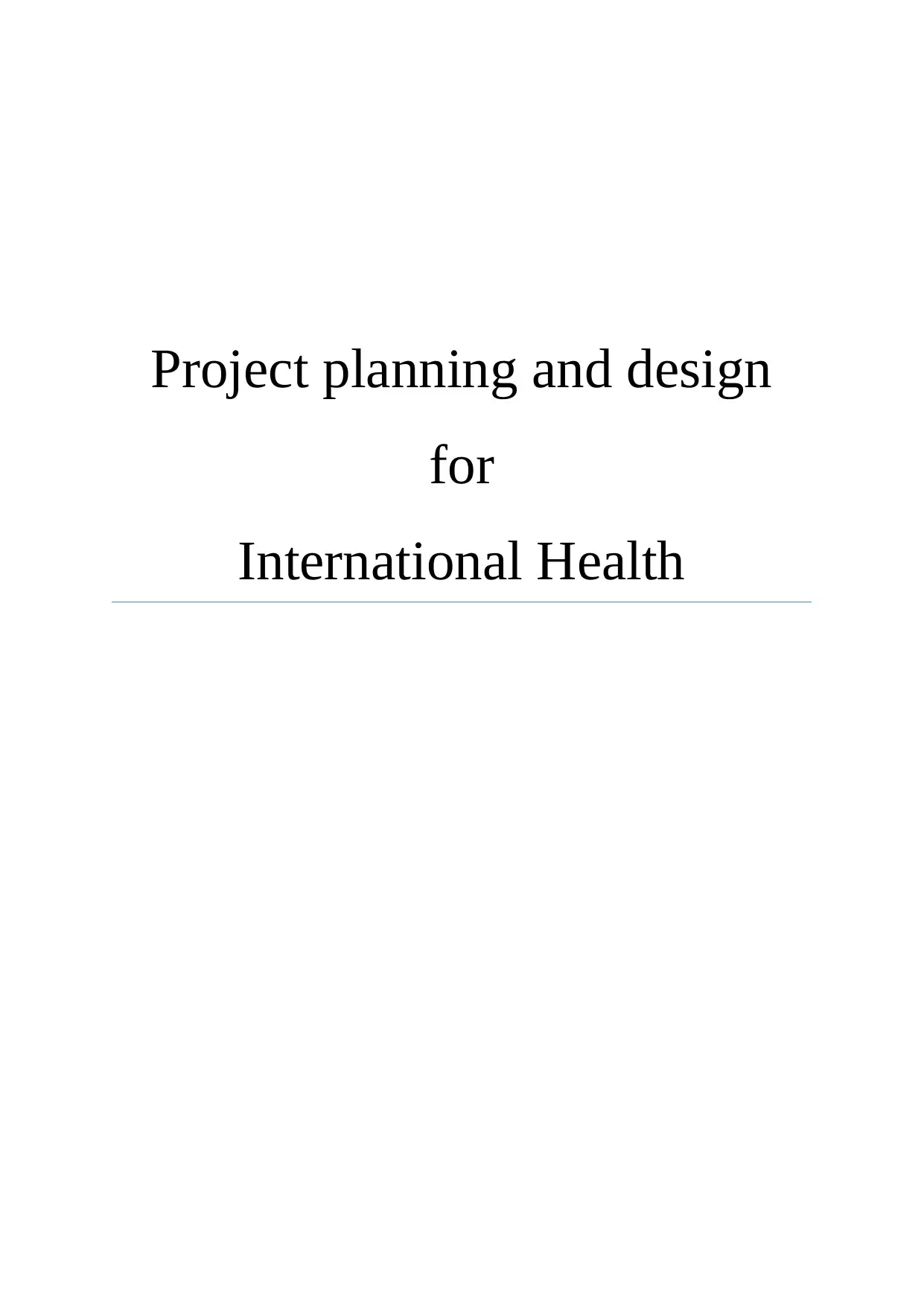
Project planning and design
for
International Health
for
International Health
Secure Best Marks with AI Grader
Need help grading? Try our AI Grader for instant feedback on your assignments.
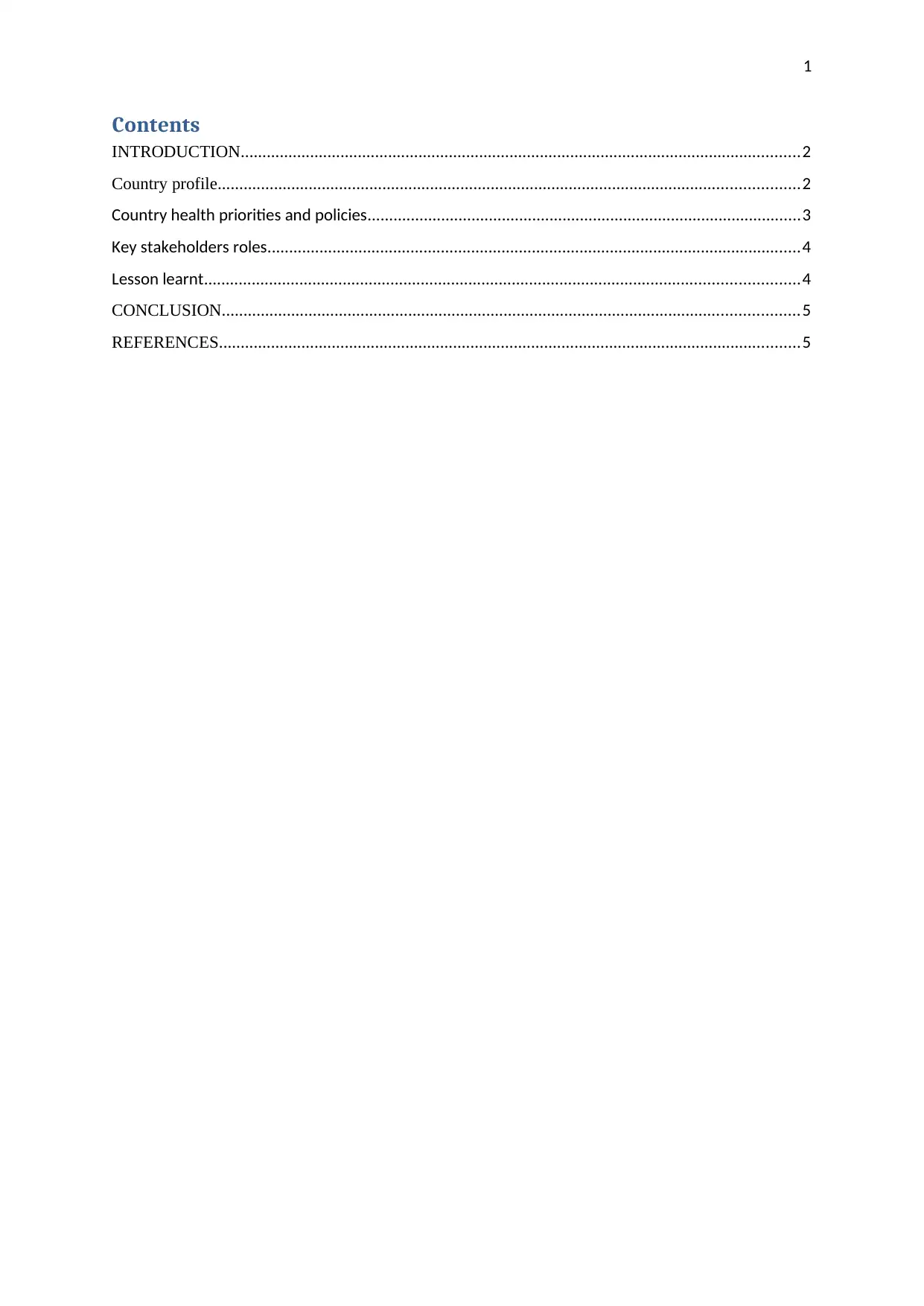
1
Contents
INTRODUCTION.................................................................................................................................2
Country profile......................................................................................................................................2
Country health priorities and policies....................................................................................................3
Key stakeholders roles...........................................................................................................................4
Lesson learnt.........................................................................................................................................4
CONCLUSION.....................................................................................................................................5
REFERENCES......................................................................................................................................5
Contents
INTRODUCTION.................................................................................................................................2
Country profile......................................................................................................................................2
Country health priorities and policies....................................................................................................3
Key stakeholders roles...........................................................................................................................4
Lesson learnt.........................................................................................................................................4
CONCLUSION.....................................................................................................................................5
REFERENCES......................................................................................................................................5
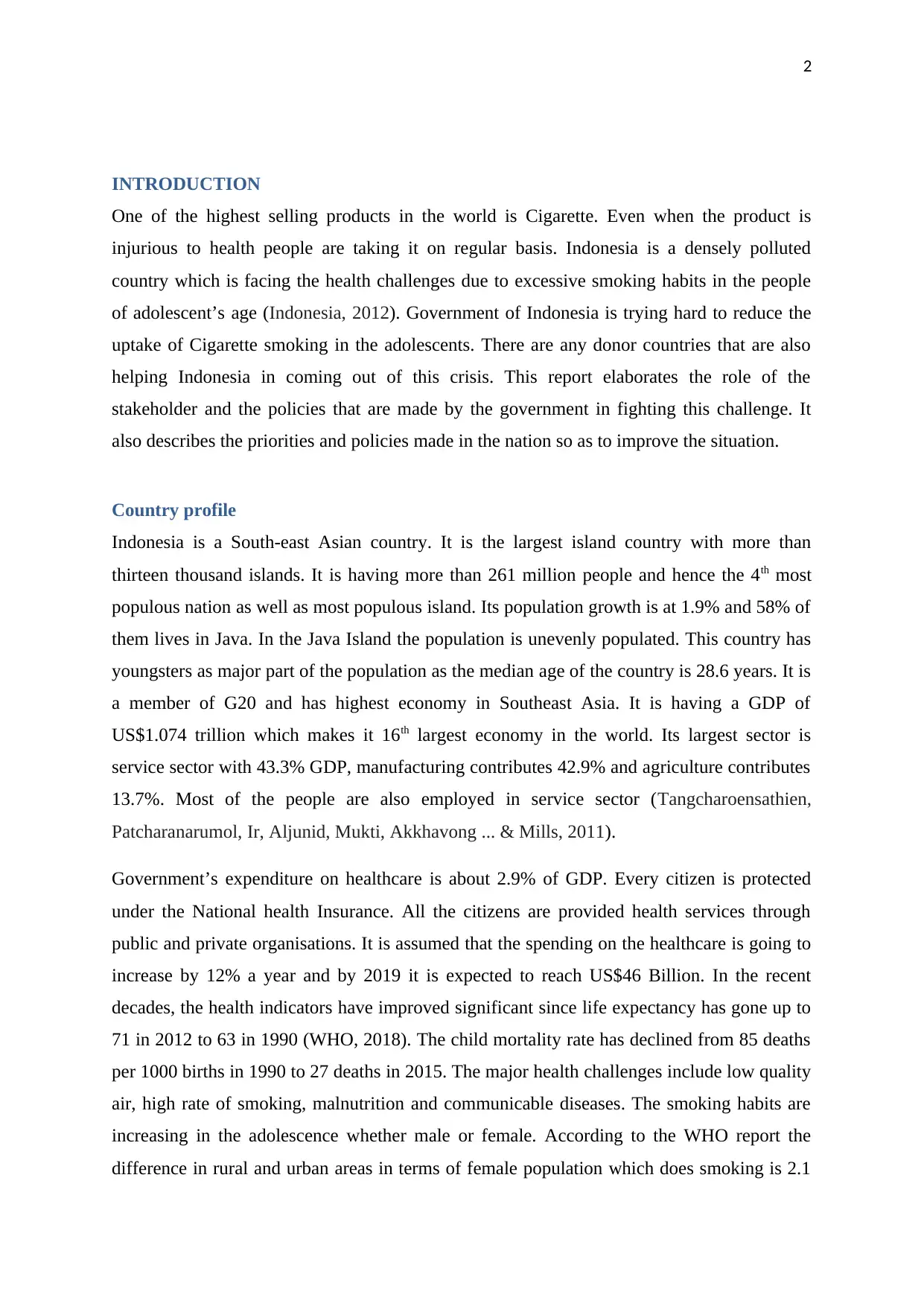
2
INTRODUCTION
One of the highest selling products in the world is Cigarette. Even when the product is
injurious to health people are taking it on regular basis. Indonesia is a densely polluted
country which is facing the health challenges due to excessive smoking habits in the people
of adolescent’s age (Indonesia, 2012). Government of Indonesia is trying hard to reduce the
uptake of Cigarette smoking in the adolescents. There are any donor countries that are also
helping Indonesia in coming out of this crisis. This report elaborates the role of the
stakeholder and the policies that are made by the government in fighting this challenge. It
also describes the priorities and policies made in the nation so as to improve the situation.
Country profile
Indonesia is a South-east Asian country. It is the largest island country with more than
thirteen thousand islands. It is having more than 261 million people and hence the 4th most
populous nation as well as most populous island. Its population growth is at 1.9% and 58% of
them lives in Java. In the Java Island the population is unevenly populated. This country has
youngsters as major part of the population as the median age of the country is 28.6 years. It is
a member of G20 and has highest economy in Southeast Asia. It is having a GDP of
US$1.074 trillion which makes it 16th largest economy in the world. Its largest sector is
service sector with 43.3% GDP, manufacturing contributes 42.9% and agriculture contributes
13.7%. Most of the people are also employed in service sector (Tangcharoensathien,
Patcharanarumol, Ir, Aljunid, Mukti, Akkhavong ... & Mills, 2011).
Government’s expenditure on healthcare is about 2.9% of GDP. Every citizen is protected
under the National health Insurance. All the citizens are provided health services through
public and private organisations. It is assumed that the spending on the healthcare is going to
increase by 12% a year and by 2019 it is expected to reach US$46 Billion. In the recent
decades, the health indicators have improved significant since life expectancy has gone up to
71 in 2012 to 63 in 1990 (WHO, 2018). The child mortality rate has declined from 85 deaths
per 1000 births in 1990 to 27 deaths in 2015. The major health challenges include low quality
air, high rate of smoking, malnutrition and communicable diseases. The smoking habits are
increasing in the adolescence whether male or female. According to the WHO report the
difference in rural and urban areas in terms of female population which does smoking is 2.1
INTRODUCTION
One of the highest selling products in the world is Cigarette. Even when the product is
injurious to health people are taking it on regular basis. Indonesia is a densely polluted
country which is facing the health challenges due to excessive smoking habits in the people
of adolescent’s age (Indonesia, 2012). Government of Indonesia is trying hard to reduce the
uptake of Cigarette smoking in the adolescents. There are any donor countries that are also
helping Indonesia in coming out of this crisis. This report elaborates the role of the
stakeholder and the policies that are made by the government in fighting this challenge. It
also describes the priorities and policies made in the nation so as to improve the situation.
Country profile
Indonesia is a South-east Asian country. It is the largest island country with more than
thirteen thousand islands. It is having more than 261 million people and hence the 4th most
populous nation as well as most populous island. Its population growth is at 1.9% and 58% of
them lives in Java. In the Java Island the population is unevenly populated. This country has
youngsters as major part of the population as the median age of the country is 28.6 years. It is
a member of G20 and has highest economy in Southeast Asia. It is having a GDP of
US$1.074 trillion which makes it 16th largest economy in the world. Its largest sector is
service sector with 43.3% GDP, manufacturing contributes 42.9% and agriculture contributes
13.7%. Most of the people are also employed in service sector (Tangcharoensathien,
Patcharanarumol, Ir, Aljunid, Mukti, Akkhavong ... & Mills, 2011).
Government’s expenditure on healthcare is about 2.9% of GDP. Every citizen is protected
under the National health Insurance. All the citizens are provided health services through
public and private organisations. It is assumed that the spending on the healthcare is going to
increase by 12% a year and by 2019 it is expected to reach US$46 Billion. In the recent
decades, the health indicators have improved significant since life expectancy has gone up to
71 in 2012 to 63 in 1990 (WHO, 2018). The child mortality rate has declined from 85 deaths
per 1000 births in 1990 to 27 deaths in 2015. The major health challenges include low quality
air, high rate of smoking, malnutrition and communicable diseases. The smoking habits are
increasing in the adolescence whether male or female. According to the WHO report the
difference in rural and urban areas in terms of female population which does smoking is 2.1
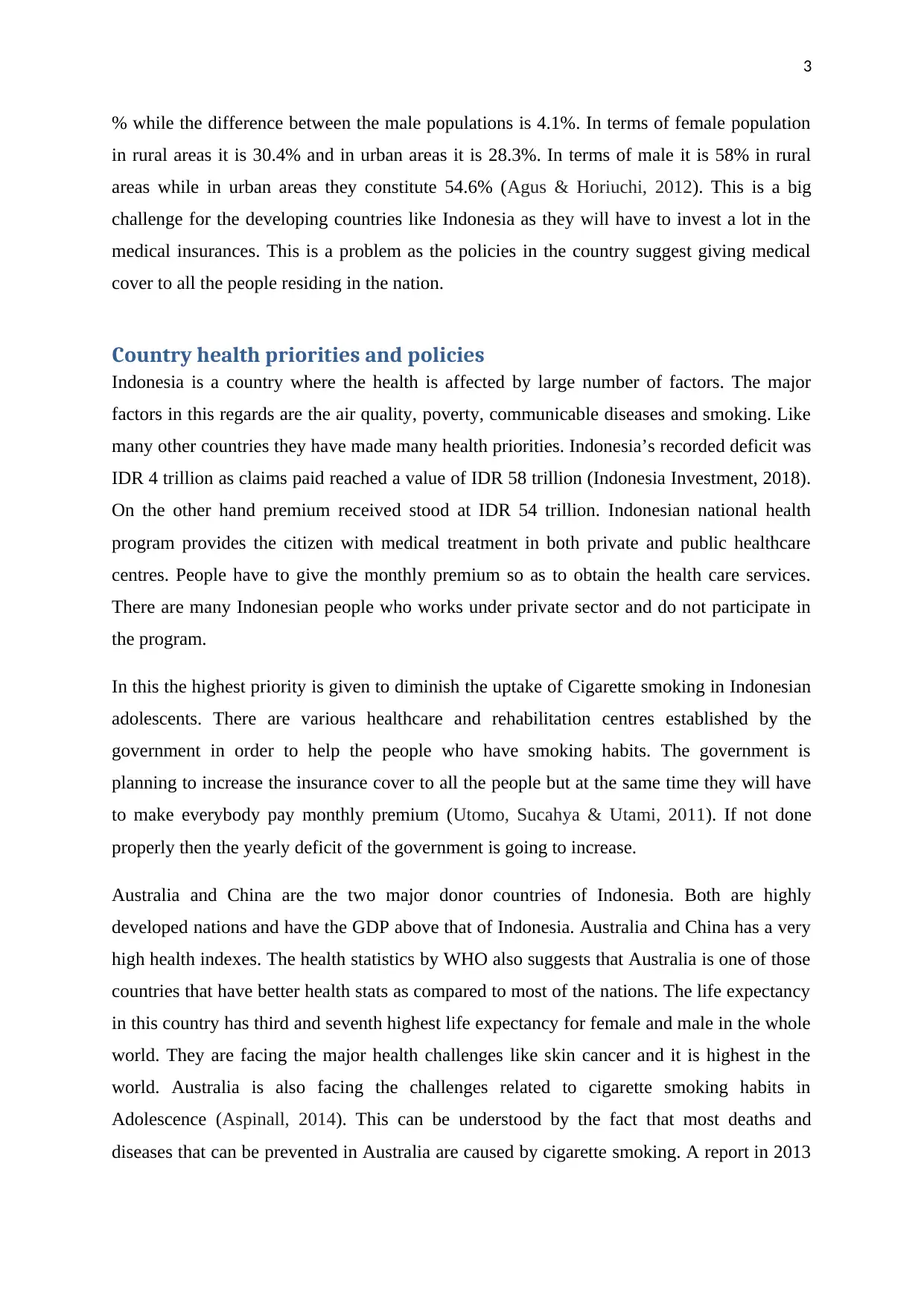
3
% while the difference between the male populations is 4.1%. In terms of female population
in rural areas it is 30.4% and in urban areas it is 28.3%. In terms of male it is 58% in rural
areas while in urban areas they constitute 54.6% (Agus & Horiuchi, 2012). This is a big
challenge for the developing countries like Indonesia as they will have to invest a lot in the
medical insurances. This is a problem as the policies in the country suggest giving medical
cover to all the people residing in the nation.
Country health priorities and policies
Indonesia is a country where the health is affected by large number of factors. The major
factors in this regards are the air quality, poverty, communicable diseases and smoking. Like
many other countries they have made many health priorities. Indonesia’s recorded deficit was
IDR 4 trillion as claims paid reached a value of IDR 58 trillion (Indonesia Investment, 2018).
On the other hand premium received stood at IDR 54 trillion. Indonesian national health
program provides the citizen with medical treatment in both private and public healthcare
centres. People have to give the monthly premium so as to obtain the health care services.
There are many Indonesian people who works under private sector and do not participate in
the program.
In this the highest priority is given to diminish the uptake of Cigarette smoking in Indonesian
adolescents. There are various healthcare and rehabilitation centres established by the
government in order to help the people who have smoking habits. The government is
planning to increase the insurance cover to all the people but at the same time they will have
to make everybody pay monthly premium (Utomo, Sucahya & Utami, 2011). If not done
properly then the yearly deficit of the government is going to increase.
Australia and China are the two major donor countries of Indonesia. Both are highly
developed nations and have the GDP above that of Indonesia. Australia and China has a very
high health indexes. The health statistics by WHO also suggests that Australia is one of those
countries that have better health stats as compared to most of the nations. The life expectancy
in this country has third and seventh highest life expectancy for female and male in the whole
world. They are facing the major health challenges like skin cancer and it is highest in the
world. Australia is also facing the challenges related to cigarette smoking habits in
Adolescence (Aspinall, 2014). This can be understood by the fact that most deaths and
diseases that can be prevented in Australia are caused by cigarette smoking. A report in 2013
% while the difference between the male populations is 4.1%. In terms of female population
in rural areas it is 30.4% and in urban areas it is 28.3%. In terms of male it is 58% in rural
areas while in urban areas they constitute 54.6% (Agus & Horiuchi, 2012). This is a big
challenge for the developing countries like Indonesia as they will have to invest a lot in the
medical insurances. This is a problem as the policies in the country suggest giving medical
cover to all the people residing in the nation.
Country health priorities and policies
Indonesia is a country where the health is affected by large number of factors. The major
factors in this regards are the air quality, poverty, communicable diseases and smoking. Like
many other countries they have made many health priorities. Indonesia’s recorded deficit was
IDR 4 trillion as claims paid reached a value of IDR 58 trillion (Indonesia Investment, 2018).
On the other hand premium received stood at IDR 54 trillion. Indonesian national health
program provides the citizen with medical treatment in both private and public healthcare
centres. People have to give the monthly premium so as to obtain the health care services.
There are many Indonesian people who works under private sector and do not participate in
the program.
In this the highest priority is given to diminish the uptake of Cigarette smoking in Indonesian
adolescents. There are various healthcare and rehabilitation centres established by the
government in order to help the people who have smoking habits. The government is
planning to increase the insurance cover to all the people but at the same time they will have
to make everybody pay monthly premium (Utomo, Sucahya & Utami, 2011). If not done
properly then the yearly deficit of the government is going to increase.
Australia and China are the two major donor countries of Indonesia. Both are highly
developed nations and have the GDP above that of Indonesia. Australia and China has a very
high health indexes. The health statistics by WHO also suggests that Australia is one of those
countries that have better health stats as compared to most of the nations. The life expectancy
in this country has third and seventh highest life expectancy for female and male in the whole
world. They are facing the major health challenges like skin cancer and it is highest in the
world. Australia is also facing the challenges related to cigarette smoking habits in
Adolescence (Aspinall, 2014). This can be understood by the fact that most deaths and
diseases that can be prevented in Australia are caused by cigarette smoking. A report in 2013
Paraphrase This Document
Need a fresh take? Get an instant paraphrase of this document with our AI Paraphraser
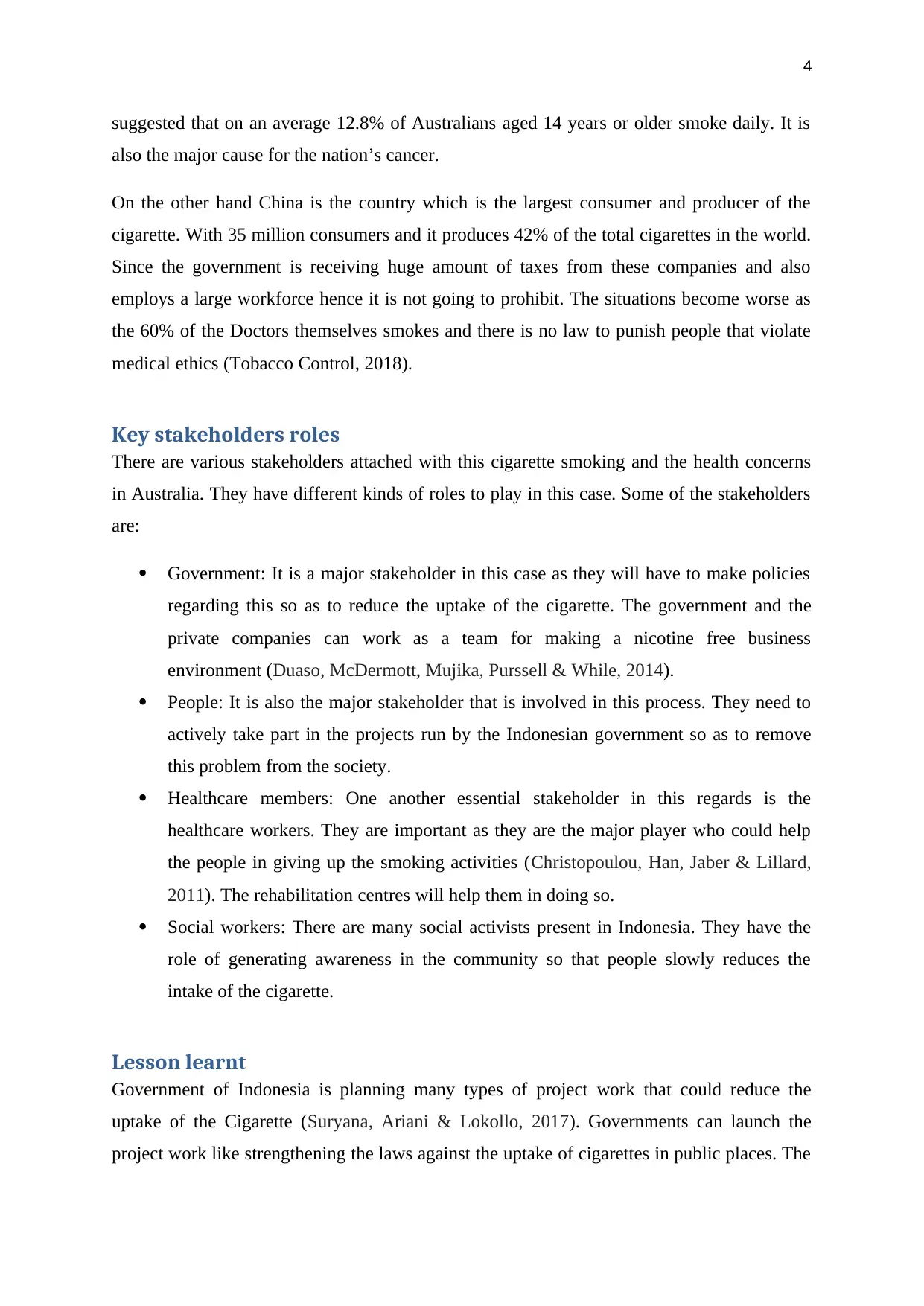
4
suggested that on an average 12.8% of Australians aged 14 years or older smoke daily. It is
also the major cause for the nation’s cancer.
On the other hand China is the country which is the largest consumer and producer of the
cigarette. With 35 million consumers and it produces 42% of the total cigarettes in the world.
Since the government is receiving huge amount of taxes from these companies and also
employs a large workforce hence it is not going to prohibit. The situations become worse as
the 60% of the Doctors themselves smokes and there is no law to punish people that violate
medical ethics (Tobacco Control, 2018).
Key stakeholders roles
There are various stakeholders attached with this cigarette smoking and the health concerns
in Australia. They have different kinds of roles to play in this case. Some of the stakeholders
are:
Government: It is a major stakeholder in this case as they will have to make policies
regarding this so as to reduce the uptake of the cigarette. The government and the
private companies can work as a team for making a nicotine free business
environment (Duaso, McDermott, Mujika, Purssell & While, 2014).
People: It is also the major stakeholder that is involved in this process. They need to
actively take part in the projects run by the Indonesian government so as to remove
this problem from the society.
Healthcare members: One another essential stakeholder in this regards is the
healthcare workers. They are important as they are the major player who could help
the people in giving up the smoking activities (Christopoulou, Han, Jaber & Lillard,
2011). The rehabilitation centres will help them in doing so.
Social workers: There are many social activists present in Indonesia. They have the
role of generating awareness in the community so that people slowly reduces the
intake of the cigarette.
Lesson learnt
Government of Indonesia is planning many types of project work that could reduce the
uptake of the Cigarette (Suryana, Ariani & Lokollo, 2017). Governments can launch the
project work like strengthening the laws against the uptake of cigarettes in public places. The
suggested that on an average 12.8% of Australians aged 14 years or older smoke daily. It is
also the major cause for the nation’s cancer.
On the other hand China is the country which is the largest consumer and producer of the
cigarette. With 35 million consumers and it produces 42% of the total cigarettes in the world.
Since the government is receiving huge amount of taxes from these companies and also
employs a large workforce hence it is not going to prohibit. The situations become worse as
the 60% of the Doctors themselves smokes and there is no law to punish people that violate
medical ethics (Tobacco Control, 2018).
Key stakeholders roles
There are various stakeholders attached with this cigarette smoking and the health concerns
in Australia. They have different kinds of roles to play in this case. Some of the stakeholders
are:
Government: It is a major stakeholder in this case as they will have to make policies
regarding this so as to reduce the uptake of the cigarette. The government and the
private companies can work as a team for making a nicotine free business
environment (Duaso, McDermott, Mujika, Purssell & While, 2014).
People: It is also the major stakeholder that is involved in this process. They need to
actively take part in the projects run by the Indonesian government so as to remove
this problem from the society.
Healthcare members: One another essential stakeholder in this regards is the
healthcare workers. They are important as they are the major player who could help
the people in giving up the smoking activities (Christopoulou, Han, Jaber & Lillard,
2011). The rehabilitation centres will help them in doing so.
Social workers: There are many social activists present in Indonesia. They have the
role of generating awareness in the community so that people slowly reduces the
intake of the cigarette.
Lesson learnt
Government of Indonesia is planning many types of project work that could reduce the
uptake of the Cigarette (Suryana, Ariani & Lokollo, 2017). Governments can launch the
project work like strengthening the laws against the uptake of cigarettes in public places. The
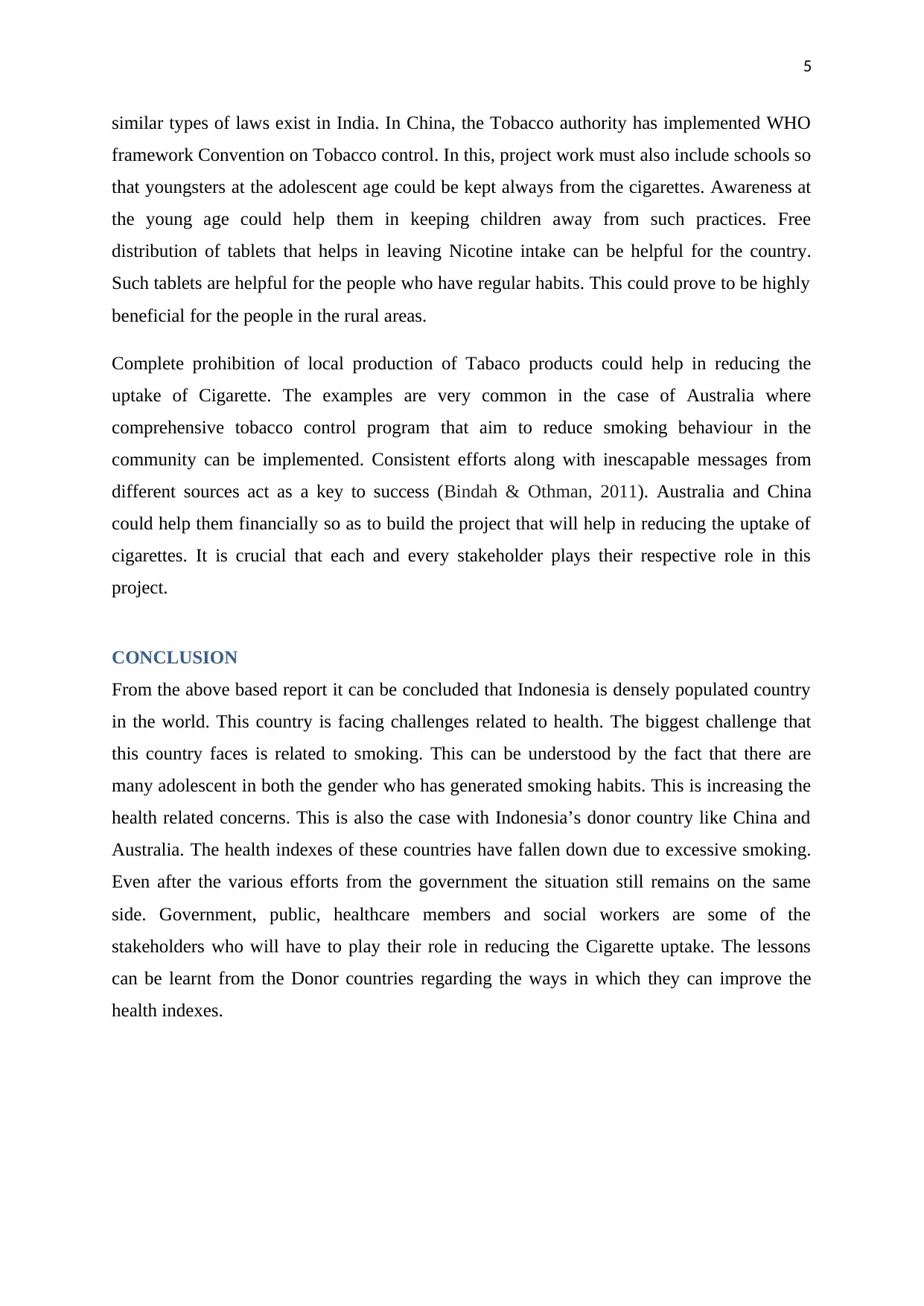
5
similar types of laws exist in India. In China, the Tobacco authority has implemented WHO
framework Convention on Tobacco control. In this, project work must also include schools so
that youngsters at the adolescent age could be kept always from the cigarettes. Awareness at
the young age could help them in keeping children away from such practices. Free
distribution of tablets that helps in leaving Nicotine intake can be helpful for the country.
Such tablets are helpful for the people who have regular habits. This could prove to be highly
beneficial for the people in the rural areas.
Complete prohibition of local production of Tabaco products could help in reducing the
uptake of Cigarette. The examples are very common in the case of Australia where
comprehensive tobacco control program that aim to reduce smoking behaviour in the
community can be implemented. Consistent efforts along with inescapable messages from
different sources act as a key to success (Bindah & Othman, 2011). Australia and China
could help them financially so as to build the project that will help in reducing the uptake of
cigarettes. It is crucial that each and every stakeholder plays their respective role in this
project.
CONCLUSION
From the above based report it can be concluded that Indonesia is densely populated country
in the world. This country is facing challenges related to health. The biggest challenge that
this country faces is related to smoking. This can be understood by the fact that there are
many adolescent in both the gender who has generated smoking habits. This is increasing the
health related concerns. This is also the case with Indonesia’s donor country like China and
Australia. The health indexes of these countries have fallen down due to excessive smoking.
Even after the various efforts from the government the situation still remains on the same
side. Government, public, healthcare members and social workers are some of the
stakeholders who will have to play their role in reducing the Cigarette uptake. The lessons
can be learnt from the Donor countries regarding the ways in which they can improve the
health indexes.
similar types of laws exist in India. In China, the Tobacco authority has implemented WHO
framework Convention on Tobacco control. In this, project work must also include schools so
that youngsters at the adolescent age could be kept always from the cigarettes. Awareness at
the young age could help them in keeping children away from such practices. Free
distribution of tablets that helps in leaving Nicotine intake can be helpful for the country.
Such tablets are helpful for the people who have regular habits. This could prove to be highly
beneficial for the people in the rural areas.
Complete prohibition of local production of Tabaco products could help in reducing the
uptake of Cigarette. The examples are very common in the case of Australia where
comprehensive tobacco control program that aim to reduce smoking behaviour in the
community can be implemented. Consistent efforts along with inescapable messages from
different sources act as a key to success (Bindah & Othman, 2011). Australia and China
could help them financially so as to build the project that will help in reducing the uptake of
cigarettes. It is crucial that each and every stakeholder plays their respective role in this
project.
CONCLUSION
From the above based report it can be concluded that Indonesia is densely populated country
in the world. This country is facing challenges related to health. The biggest challenge that
this country faces is related to smoking. This can be understood by the fact that there are
many adolescent in both the gender who has generated smoking habits. This is increasing the
health related concerns. This is also the case with Indonesia’s donor country like China and
Australia. The health indexes of these countries have fallen down due to excessive smoking.
Even after the various efforts from the government the situation still remains on the same
side. Government, public, healthcare members and social workers are some of the
stakeholders who will have to play their role in reducing the Cigarette uptake. The lessons
can be learnt from the Donor countries regarding the ways in which they can improve the
health indexes.
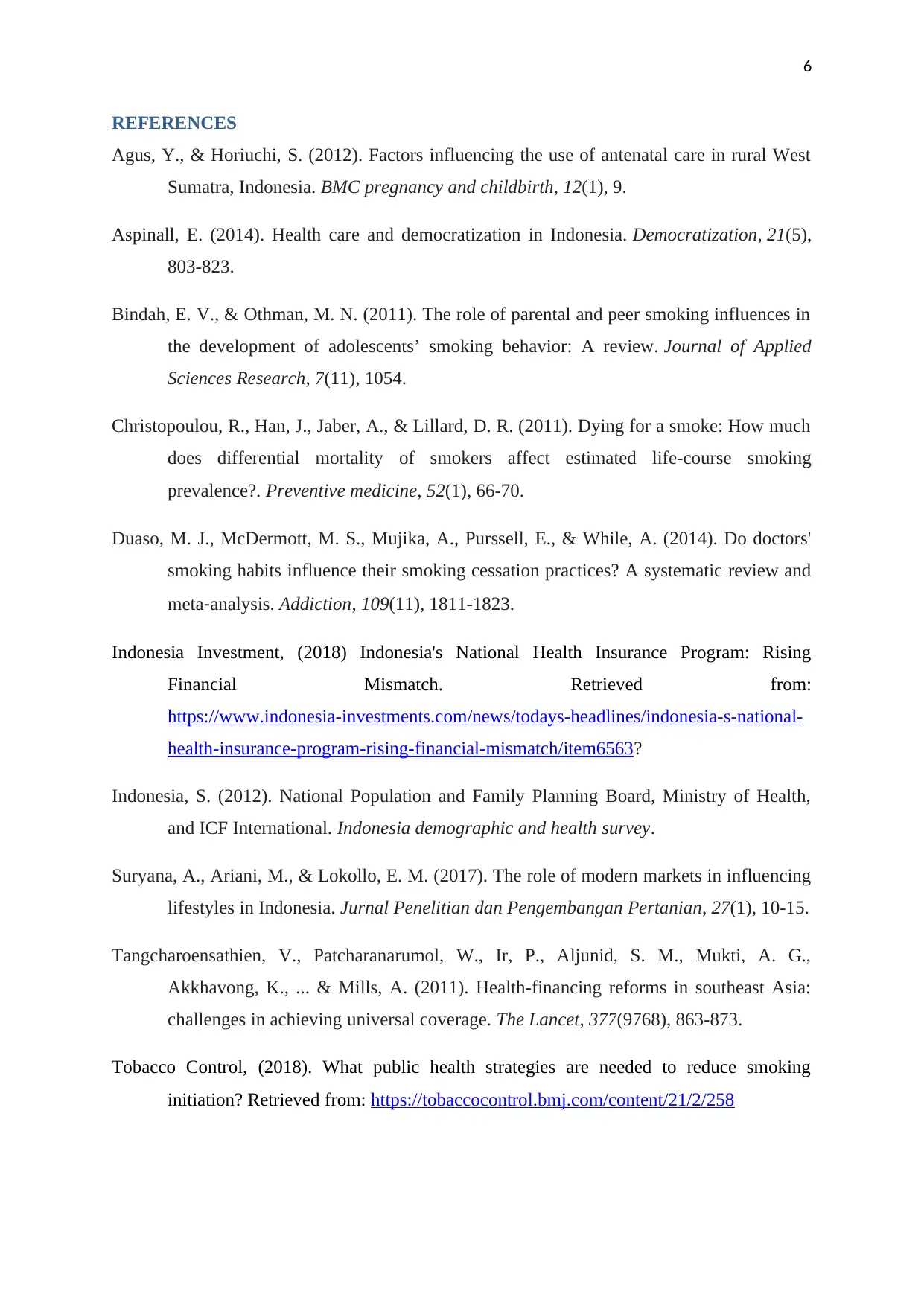
6
REFERENCES
Agus, Y., & Horiuchi, S. (2012). Factors influencing the use of antenatal care in rural West
Sumatra, Indonesia. BMC pregnancy and childbirth, 12(1), 9.
Aspinall, E. (2014). Health care and democratization in Indonesia. Democratization, 21(5),
803-823.
Bindah, E. V., & Othman, M. N. (2011). The role of parental and peer smoking influences in
the development of adolescents’ smoking behavior: A review. Journal of Applied
Sciences Research, 7(11), 1054.
Christopoulou, R., Han, J., Jaber, A., & Lillard, D. R. (2011). Dying for a smoke: How much
does differential mortality of smokers affect estimated life-course smoking
prevalence?. Preventive medicine, 52(1), 66-70.
Duaso, M. J., McDermott, M. S., Mujika, A., Purssell, E., & While, A. (2014). Do doctors'
smoking habits influence their smoking cessation practices? A systematic review and
meta‐analysis. Addiction, 109(11), 1811-1823.
Indonesia Investment, (2018) Indonesia's National Health Insurance Program: Rising
Financial Mismatch. Retrieved from:
https://www.indonesia-investments.com/news/todays-headlines/indonesia-s-national-
health-insurance-program-rising-financial-mismatch/item6563?
Indonesia, S. (2012). National Population and Family Planning Board, Ministry of Health,
and ICF International. Indonesia demographic and health survey.
Suryana, A., Ariani, M., & Lokollo, E. M. (2017). The role of modern markets in influencing
lifestyles in Indonesia. Jurnal Penelitian dan Pengembangan Pertanian, 27(1), 10-15.
Tangcharoensathien, V., Patcharanarumol, W., Ir, P., Aljunid, S. M., Mukti, A. G.,
Akkhavong, K., ... & Mills, A. (2011). Health-financing reforms in southeast Asia:
challenges in achieving universal coverage. The Lancet, 377(9768), 863-873.
Tobacco Control, (2018). What public health strategies are needed to reduce smoking
initiation? Retrieved from: https://tobaccocontrol.bmj.com/content/21/2/258
REFERENCES
Agus, Y., & Horiuchi, S. (2012). Factors influencing the use of antenatal care in rural West
Sumatra, Indonesia. BMC pregnancy and childbirth, 12(1), 9.
Aspinall, E. (2014). Health care and democratization in Indonesia. Democratization, 21(5),
803-823.
Bindah, E. V., & Othman, M. N. (2011). The role of parental and peer smoking influences in
the development of adolescents’ smoking behavior: A review. Journal of Applied
Sciences Research, 7(11), 1054.
Christopoulou, R., Han, J., Jaber, A., & Lillard, D. R. (2011). Dying for a smoke: How much
does differential mortality of smokers affect estimated life-course smoking
prevalence?. Preventive medicine, 52(1), 66-70.
Duaso, M. J., McDermott, M. S., Mujika, A., Purssell, E., & While, A. (2014). Do doctors'
smoking habits influence their smoking cessation practices? A systematic review and
meta‐analysis. Addiction, 109(11), 1811-1823.
Indonesia Investment, (2018) Indonesia's National Health Insurance Program: Rising
Financial Mismatch. Retrieved from:
https://www.indonesia-investments.com/news/todays-headlines/indonesia-s-national-
health-insurance-program-rising-financial-mismatch/item6563?
Indonesia, S. (2012). National Population and Family Planning Board, Ministry of Health,
and ICF International. Indonesia demographic and health survey.
Suryana, A., Ariani, M., & Lokollo, E. M. (2017). The role of modern markets in influencing
lifestyles in Indonesia. Jurnal Penelitian dan Pengembangan Pertanian, 27(1), 10-15.
Tangcharoensathien, V., Patcharanarumol, W., Ir, P., Aljunid, S. M., Mukti, A. G.,
Akkhavong, K., ... & Mills, A. (2011). Health-financing reforms in southeast Asia:
challenges in achieving universal coverage. The Lancet, 377(9768), 863-873.
Tobacco Control, (2018). What public health strategies are needed to reduce smoking
initiation? Retrieved from: https://tobaccocontrol.bmj.com/content/21/2/258
Secure Best Marks with AI Grader
Need help grading? Try our AI Grader for instant feedback on your assignments.
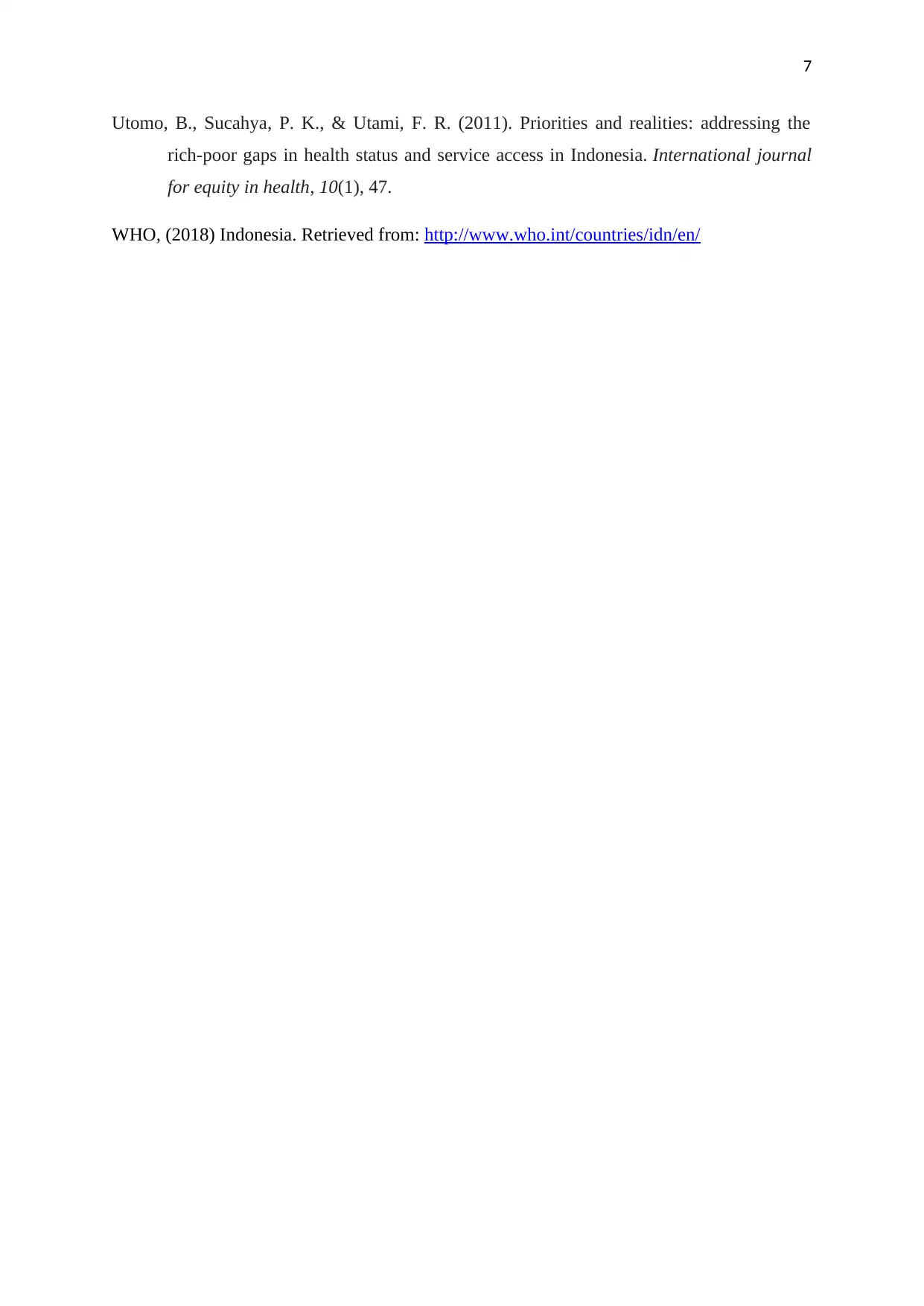
7
Utomo, B., Sucahya, P. K., & Utami, F. R. (2011). Priorities and realities: addressing the
rich-poor gaps in health status and service access in Indonesia. International journal
for equity in health, 10(1), 47.
WHO, (2018) Indonesia. Retrieved from: http://www.who.int/countries/idn/en/
Utomo, B., Sucahya, P. K., & Utami, F. R. (2011). Priorities and realities: addressing the
rich-poor gaps in health status and service access in Indonesia. International journal
for equity in health, 10(1), 47.
WHO, (2018) Indonesia. Retrieved from: http://www.who.int/countries/idn/en/
1 out of 8
![[object Object]](/_next/static/media/star-bottom.7253800d.svg)



